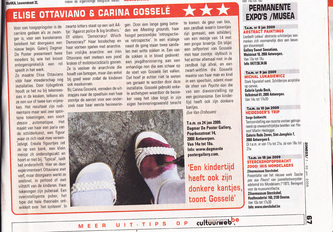MEETING GROUNDS
If memories are what shape the past, and if the past determines our memories, then we are struck by a paradox. For this would mean that memories create our past and that they in turn are effects of the past as well.
Such paradoxes play a central roll in Carina Gosselé’s current project, ‘Meeting Grounds”.
This work focuses primarily on the possibility of reliving, rearranging and abstracting personal memories with the aim of altering time.
This process of alteration, to which she submits her memories, sheds new light on the past. She does this by transforming some unfinished and loosely developed works and re-shaping them into new ones.
Throughout the installation, Gosselé comes to terms with trauma, playfulness and memories of a conflicted childhood.
This personal aspect to the work simultaneously consumes and alienates the viewer. A sensation of voyeurism is felt by spectators as they realize they are bearing witness to some of the most intimate and potent memories of the artist as a young girl.
Text by Matthieu Truyens
If memories are what shape the past, and if the past determines our memories, then we are struck by a paradox. For this would mean that memories create our past and that they in turn are effects of the past as well.
Such paradoxes play a central roll in Carina Gosselé’s current project, ‘Meeting Grounds”.
This work focuses primarily on the possibility of reliving, rearranging and abstracting personal memories with the aim of altering time.
This process of alteration, to which she submits her memories, sheds new light on the past. She does this by transforming some unfinished and loosely developed works and re-shaping them into new ones.
Throughout the installation, Gosselé comes to terms with trauma, playfulness and memories of a conflicted childhood.
This personal aspect to the work simultaneously consumes and alienates the viewer. A sensation of voyeurism is felt by spectators as they realize they are bearing witness to some of the most intimate and potent memories of the artist as a young girl.
Text by Matthieu Truyens

